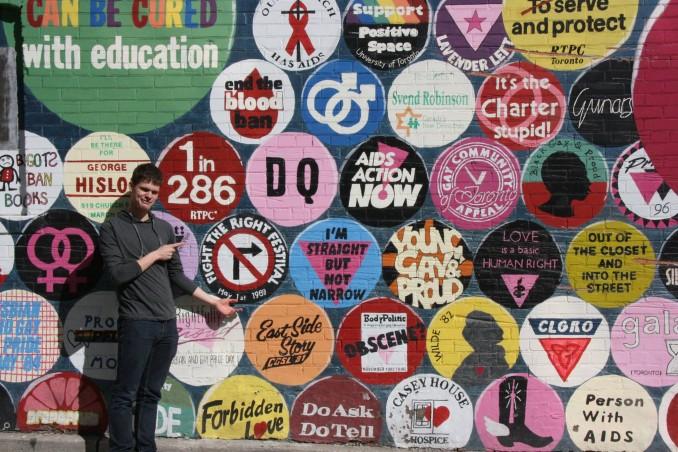By Mitchell Thompson
What are gay politics?
As a young, closeted suburbanite I dreamed that all gays were cool lefties. Buying into the stuff I’d read about gay as a political and subversive act, I’d hoped that once I’d entered an urban, gay environment, I’d see a world dripping with progress.
That’s not quite how it is.
It struck me when I had a three-way with a centrist and a right-winger. A friend joked that it was the entire political spectrum on one bed. It wasn’t the entire spectrum — we needed a centre-right guy, a centre-left guy, a fascist and at least a few anarchists to sit on the sidelines and shout at each other to have the entire spectrum — but it was close.
The sex was subpar and the conversation was weird. The centrist was wearing an Animal Farm t-shirt he’d put on as a joke. The right-winger kept joking about how much he liked Starbucks for some inexplicable reason.
But the weirdest part was towards the end of the sex. Righty made a joke that I don’t remember because it wasn’t funny (right wingers are never funny), but it had something to do with us all having something in common.
The centrist pointed at me, “Well, except him.” “Yeah ‘cause you’re a leftist,” righty said.
I shrugged like Atlas.
“Well, we’re successful and you’re not,” righty continued.
I considered kicking him out, before realizing that it was his place. Maybe he had a point but that comment totally killed the mood. This was an awakening: sexually, in the sense that I realized I don’t like three-ways and politically, as I realized that some gays are knuckle draggers.
I lost interest in gay culture and politics after that. I’ve been trying to remedy it lately, as I try to unite my queer identity with my general fiery lefty identity.
The results have been mixed but not entirely bad.
I’ve become really interested in radical AIDS activism in the 80s, a fight for improvements over equality. It used the cause to fight poverty, austerity, private health care and greed in general. Now perhaps the books I’ve read romanticized the tradition, but it seems to have come from the sense that the fight for rights shouldn’t agree to the limits that are imposed on it. Further, it seems to have evolved from the sense that men who fuck shouldn’t have to deal with disease or poverty and the sense that what we really need is liberation.
A few weeks ago a story by The Eyeopener got me thinking about this idea. In the article on the Ontario Undergraduate Student’s Alliance’s tuition freeze initiative, Vajdaan Tanveer from Reignite said the initiative “fails to include marginalized communities — racialised and LGBTQ people, and women — struggling to attain post-secondary education.” He said, “They go hand-in-hand and you can’t talk about one without talking about the other.”
Though the Liberals have announced a plan to improve access to education for students from low-income families, there’s still a fight here and queers have a place in it.
Austerity, poverty and student debt surely hurt more gays than the blood ban, or right-wing American bakers, so it seems obvious that a push for gay rights should include those fights as well.
Yes, the 519 does respectable work and other organizations are active in the fight against queer youth homelessness and have made some gains. But agitation seems to be missing and that’s unfortunate. Though we have causes, the general solutions we push for tend to be short term, often in the face of long-term and interrelated problems.
It kind of reminds me of an article in The Nation about the left and right of gay politics, studying a feud between Andrew Sullivan and Tony Kushner. The article asks “Will the gay movement spend its last days running a series of pop-up outrage campaigns whose relation to any improvement in gay people’s actual lives becomes increasingly notional? Or will it find, deep in the recesses of its political memory, some way to talk about inequality, commodification, police surveillance, gender, sex, health, love and desire writ large?”
Out of the Starbucks and into the streets!












Leave a Reply